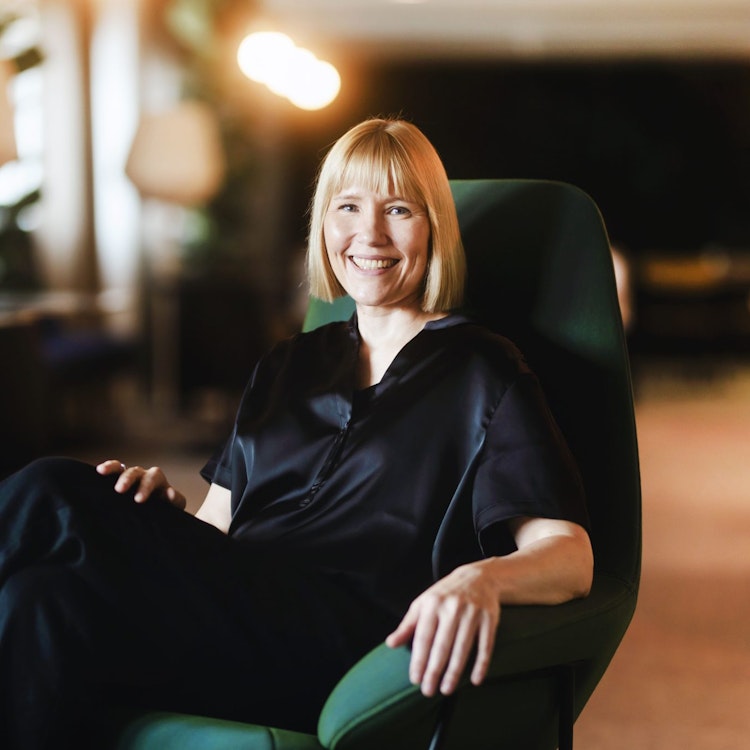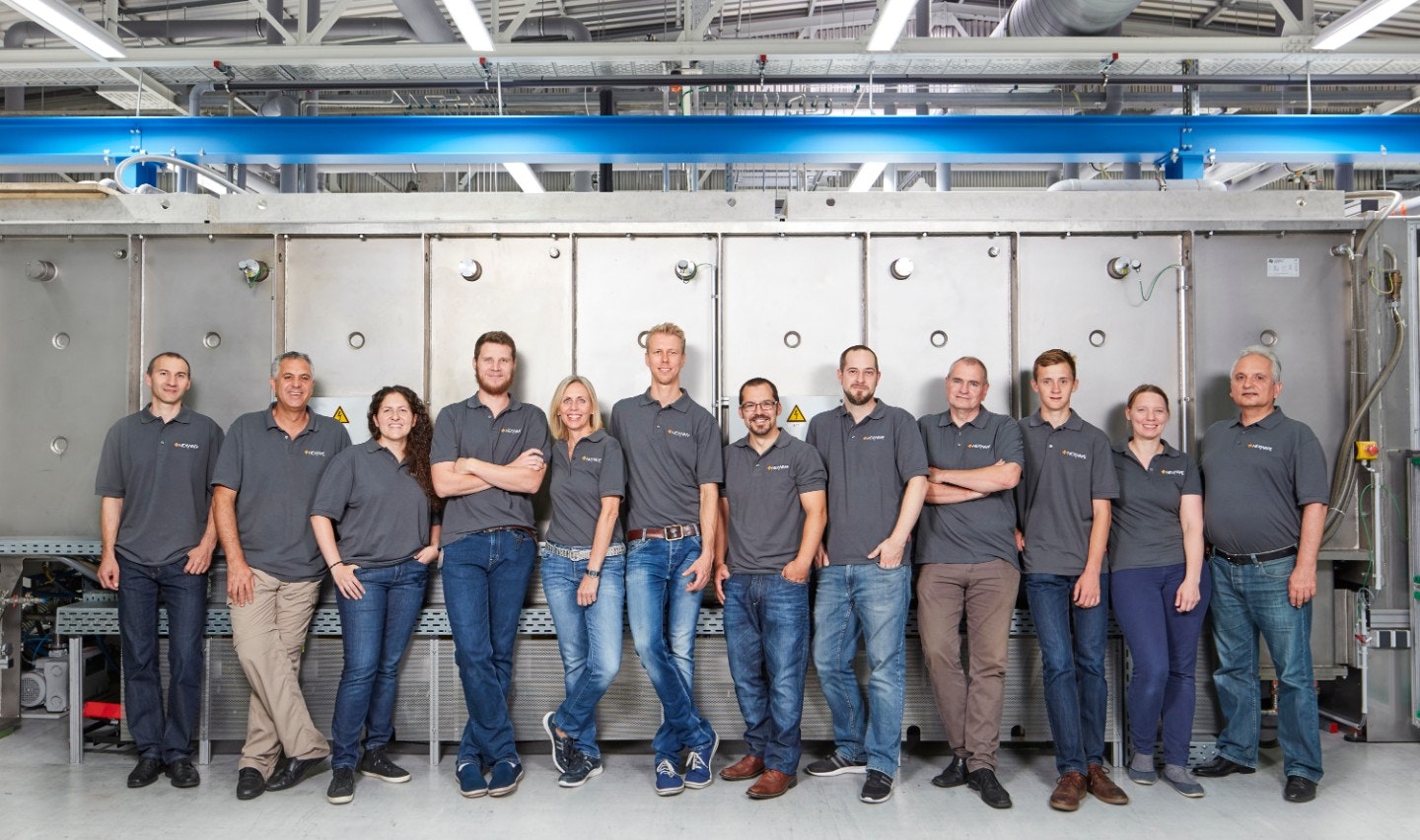What do Lidl, Auchan, Sephora and Flink have in common? They’re all customers of RELEX Solutions, one of Finland’s four private tech companies.
RELEX makes supply-chain and retail-planning software — which might sound boring, but it's extremely important when you consider how much inventory, especially food, is wasted due to poor planning.
And RELEX’s three cofounders know better than anyone the impact that optimising supply chains can have on a company’s bottom line. The startup was born out of the research that the trio was doing into supply-chain efficiencies in consumer goods.
At some point, they felt they could have more impact by actually applying their findings in the real world, and started RELEX in 2005. It now has 1,800 employees.
Sifted sat down with cofounder Johanna Småros to talk about the company’s decades-long journey from academia to commercialisation, just how many millions of kilos of waste annually the company is helping to avoid and why RELEX’s engineers are tired of hearing about AI.
You can listen to the full interview here, or read the highlights below.
Her answers have been edited for brevity and clarity.
How have corporate views on sustainability changed over the life of RELEX?
The European Union's Corporate Sustainability Reporting Directive — it's a mouthful — and their guidelines on how you can use green claims in marketing are really pushing companies to do their homework when it comes to environmental impact.
It's actually quite tedious work to try to map out supply chains and their impact. The good news is there is a shift in focus away from doing marketing stunts or things that feel like they are done for publicity, without huge impact: like launching a more sustainable product line with a bit of organic cotton, or maybe a component of recycled plastics. This [regulation] forces companies to look a bit broader.
In the short term, the cynical part of me thinks that this new regulation will mainly create tonnes of work for the big consultancies. There's going to be so much reporting. But then the optimist might believe that in the longer term, having that visibility, that better understanding of these supply chains or business ecosystems will help us focus on where the impact is biggest. But then the question is, of course, how far away is this long term?
I realised when I actually started doing sales that I loved it
How did RELEX go to market given that Finland is a small market?
[Finland] is just amazingly small. So if we had focused on, for example, food retail only, there would have been like three clients available. You just can't build your business that way. So I think our first client was consumer electronics, and then the next one was agricultural retail, and then it was bookstores. And then it was car tyres. Every one of them pushed us because they had some problems that were very similar and then their own unique challenges.
The first year we treated every client as an R&D project. And then when we felt that we had a solid repeatable, actual product, we started looking to expand. We started by taking the big leap and cold-calling Swedes, the neighbours, and that was basically just a test of: "Can we sell this anywhere outside of Finland?"
We expanded in Scandinavia, but then in parallel, entered the UK and Germany. We chose Germany because it's a big and very attractive market. And the UK because that's where all the US companies go first, because of language and size of market.
How did those calls to the Swedes go?
I'm a Swedish-speaker myself. So in the end, you do what cofounders do: you pick up the phone and start seeing if you can make something happen.
The fun thing about sales I realised, when I actually started doing it, was that I loved it. I went in to meet with people and we talked about things that I was really interested in.
So every time I came out of a first meeting, I was like, "Oh, I could save them tons of money, this would be so fun." So it didn't really feel like selling.
What was behind the decision to raise external capital?
Quite early on, we made an explicit decision not to raise seed funding. The logic was you can either spend time talking to investors or you can spend that time with clients and try to get the money from them, and learn a lot about their problems and what they're willing to pay for, and so on.
We bootstrapped for about 10 years. Then in 2014, we were already quite successful in Europe, but hadn't done anything in the US yet. And we felt that the time was right to enter the US market in 2015. So that's when we started talking to investors, because it was apparent that that would require investment.
We have raised additional funding when there’s been the need to or the opportunity to invest in, for example, sales and marketing or R&D, or acquisitions.
What do you think about choosing the right partners in terms of external investment?
We were in a very good position from that perspective. And that's one benefit of bootstrapping — rather than kind of selling your idea and your team, you actually have proof. We had data on good execution, solid execution for many years and profitability. It was also quite evident that this is scalable.
It sounds super arrogant, but we actually kind of started picking up the phone rather than reaching out to people at that point, because we were on the radar for many of these tech investors. They are really good at what they do. They do tend to find you even if the press doesn't cover you at that point.
We had a few things that we were looking for. For example, we wanted to avoid a situation where there would be a forced exit, for example. So we looked at what funds they were allocating from. We looked at data on how long they had held on to previous portfolio companies. We looked at what they had invested in previously, and then we also asked for reference calls with portfolio companies specifically, portfolio companies where not everything had gone according to the original plan, just to get a sense of what the response is if something goes a bit south.
Last year, RELEX’s founders set up a €100m charitable foundation to fight climate change and reduce inequality, the RELEX Foundation. Tell us about that.
It's a nonprofit organisation. The aim is to build better futures for generations to come by fostering biodiversity, furthering climate change mitigation, promoting human rights and increased equality across the world.
It's its own independent entity from RELEX, but the name is shared because we wanted to pay tribute to the current and the former and future employees of RELEX. A big proportion of the value that the foundation is going to be reallocating comes from the work that all these wonderful people have contributed.
Why we set up the foundation is that none of us cofounders were ever in this for the money. But you know how it goes with scalable tech companies: when things go well, the gains are disproportionately large. In short, I think we've already made more money than we ever dreamed of and definitely more than we need. So I felt: Why sit on this and wait until retirement when we can invest it in a good thing right now.
What are your tips for a founder starting out?
The irony here is that I always have like a tonne of disclaimers before I give any advice. Because you should never trust otherwise. Advice always comes from a specific place. And if you don't understand where it comes from, it's really hard to tell if it's relevant advice or not. So for example, if you look at our journey, it's business to business, enterprise software. It's quite different from a tech company in the business-to-consumer space that has different metrics.
Is RELEX looking at AI? Everyone in tech is asking this now, but from the beginning you were looking at big data, right?
Absolutely. So I think our engineers are a bit allergic to AI at this point, because they've been doing it forever. It's just being called different things, just typically some algorithm name. And now, it's like "AI! It's all AI!" Yeah, but this is also AI, and I did it in student coursework back in the 90s.
It's core to what we do. We have these different types of problems. And then there are a lot of different tools for how you solve it. And sometimes it's super-fancypants AI, like genetic algorithms to use swarm intelligence to solve a problem. Sometimes, it's good old-school, statistical analysis, and then you can still squeeze the juice out of it.
And the thing is that it's not just AI that's developed, it's also processing power. You can just compute so much more. So things that you kind of knew you could do 100 years ago that you just couldn't in practice. This is something that's also moving constantly. You can just do more with the data. And then the third component is the data. So having access to data, richer data.
Surprisingly, we still work a lot with promotions. We can do beautiful forecasts, for example, on how a promotion will impact things considering what type of product it is; what the price change is, how you display it in the store, and whatnot.
But still, for many of our clients, the big challenge is that they don't know about the promotions early enough. So if you have a supply chain that takes a couple of weeks to produce things and you just don't know that you're gonna run a promotion next week, it's going to be really difficult. Or then you just don't have the data in systems. So, you know, some parts are really fancy analytics, but then there's a large chunk of master data management and process that is so unsexy but so important.



